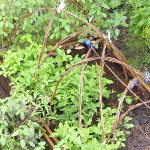Search
Latest topics
» N & C Midwest: Nov. Dec. 2024by Scorpio Rising Yesterday at 8:23 pm
» Butterbaby Hybrid Squash (Butternut)
by Scorpio Rising Yesterday at 8:19 pm
» Indoor Lighting for Kitchen Herbs & Lettuce
by OhioGardener 11/22/2024, 6:58 pm
» Catalog season has begun!
by OhioGardener 11/22/2024, 3:35 pm
» Happy Birthday!!
by AtlantaMarie 11/22/2024, 4:13 am
» Interesting Marketing for Compost
by OhioGardener 11/21/2024, 7:29 pm
» How does green turn to brown?
by OhioGardener 11/21/2024, 4:58 pm
» Ohio Gardener's Greenhouse
by OhioGardener 11/21/2024, 12:16 pm
» Tree roots, yeeessss.....
by sanderson 11/20/2024, 2:21 am
» The SFG Journey-Biowash
by has55 11/19/2024, 7:37 pm
» What are you eating from your garden today?
by OhioGardener 11/19/2024, 8:27 am
» Cooked worms?
by KiwiSFGnewbie 11/19/2024, 1:04 am
» New SFG gardener in Auckland
by KiwiSFGnewbie 11/16/2024, 11:25 pm
» Kiwi's SFG Adventure
by KiwiSFGnewbie 11/12/2024, 7:10 pm
» Thanksgiving Cactus
by OhioGardener 11/12/2024, 5:40 pm
» Need Garden Layout Feedback
by markqz 11/9/2024, 9:16 pm
» Thai Basil
by Scorpio Rising 11/8/2024, 8:52 pm
» How best to keep a fallow SFG bed
by KiwiSFGnewbie 11/8/2024, 8:11 pm
» Preserving A Bumper Tomato Harvest with Freezing vs Canning
by plantoid 11/7/2024, 11:36 am
» Mark's first SFG
by sanderson 11/6/2024, 11:51 pm
» What Have You Picked From Your Garden Today
by OhioGardener 11/5/2024, 2:29 pm
» Greetings from Southeastern Wisconsin
by sanderson 11/5/2024, 2:01 pm
» Spinning Compost Bin-need some ideas
by rtfm 11/2/2024, 7:49 pm
» Growing fruit trees in Auckland
by OhioGardener 10/31/2024, 4:23 pm
» Vermiculite -- shipping sale through 10/31/2024
by markqz 10/30/2024, 2:27 pm
» N & C Midwest: October 2024
by Scorpio Rising 10/30/2024, 10:38 am
» Old Mulch and Closing Beds for Winter
by sanderson 10/26/2024, 11:00 pm
» Hello from Land of Umpqua, Oregon Zone 8b
by sanderson 10/25/2024, 3:14 pm
» Hello everyone!
by SFGHQSTAFF 10/24/2024, 3:22 pm
» Senior Gardeners
by sanderson 10/23/2024, 6:09 pm
Google
Pill Bugs!!!!!!!
+29
walshevak
Kelejan
yolos
CitizenKate
Scorpio Rising
No_Such_Reality
landarch
Kathy Gizzi
YorkR88
Rahab222
manda99
Marc Iverson
rillgardens
Windmere
littlejo
BrianDorry55
MsSmilesT
drixnot
Lindacol
CapeCoddess
llama momma
Lemonie
sanderson
R&R 1011
jimmy cee
southern gardener
donnainzone5
camprn
floyd1440
33 posters
Page 4 of 4
Page 4 of 4 •  1, 2, 3, 4
1, 2, 3, 4
 the other side of the pill bug issue
the other side of the pill bug issue
Study Finds ‘Rollie Pollies’ Remove Heavy Metals From Soil, Stabilizing Growing Conditions, Protecting Groundwater
June 19, 2017 Mike S.

What’s interesting about these critters is that they are not bugs at all. They are crustaceans and more closely resemble crabs and shrimp, not insects. They are characterized by their ability to roll up into a ball when they feel threatened.
Read Also: 24 Lost Gardening Tips from 100 Years
Breeding or collecting pill bugs may be an important practice for homesteading and gardening. The guts of these pill bugs contain a number of microbes that help the critter feed on dead, organic matter. By releasing mass quantities of pill bugs into a mature garden, one can be assured that dead plant matter is being properly broken down and returned to healthy soil.
Pillbugs play an important role in the cycle of healthy plant life. They return organic matter to the soil so it can be digested further by fungi, protozoans and bacteria. This process produces a natural supply of nitrates, phosphates and other vital nutrients that plants need to thrive now and in future growing seasons.
One very unique quality that these crustaceans possess is their ability to safely remove heavy metals from soil. For this reason, they are an important tool for cleaning up soil contaminated with pollutants like lead, cadmium and arsenic. In coal spoils and slag heaps, pill bugs come in handy.
They take in heavy metals like lead and cadmium and crystallize these ions in their guts. The heavy metal toxins are then made into spherical deposits in the mid gut. With this special cleanup property, pill bugs survive where most creatures can’t, in the most contaminated sites.
The magic of the pill bugs helps reestablish healthy soil and prevents toxic metal ions from leaching into the groundwater. This means pill bugs are also protecting well water from becoming contaminated while stabilizing soils.
This old forgotten secrets helped our parents survive!
If you enjoyed this article or learned something new, please don’t forget to share it with others so they have a chance to enjoy this free information. This article is open source and free to reblog or use if you give a direct link back to the original article URL. Thanks for taking the time to support an open source initiative. We believe all information should be free and available to everyone. Have a good day and we hope to see you soon!
June 19, 2017 Mike S.

Turns out a little bug we don’t think of much just so happens to be one of the best protectors of soil ever imaginable. Read on to find out more!
Turn over a brick or a board that has been lying in the yard for a while and underneath you may find a collection of pill bugs scurrying about. Also known as “rollie pollies” or woodlice, these grey-colored creatures can be found in many dark, moist environments feeding on decaying matter.What’s interesting about these critters is that they are not bugs at all. They are crustaceans and more closely resemble crabs and shrimp, not insects. They are characterized by their ability to roll up into a ball when they feel threatened.
Read Also: 24 Lost Gardening Tips from 100 Years
Breeding or collecting pill bugs may be an important practice for homesteading and gardening. The guts of these pill bugs contain a number of microbes that help the critter feed on dead, organic matter. By releasing mass quantities of pill bugs into a mature garden, one can be assured that dead plant matter is being properly broken down and returned to healthy soil.
Pillbugs play an important role in the cycle of healthy plant life. They return organic matter to the soil so it can be digested further by fungi, protozoans and bacteria. This process produces a natural supply of nitrates, phosphates and other vital nutrients that plants need to thrive now and in future growing seasons.
One very unique quality that these crustaceans possess is their ability to safely remove heavy metals from soil. For this reason, they are an important tool for cleaning up soil contaminated with pollutants like lead, cadmium and arsenic. In coal spoils and slag heaps, pill bugs come in handy.
They take in heavy metals like lead and cadmium and crystallize these ions in their guts. The heavy metal toxins are then made into spherical deposits in the mid gut. With this special cleanup property, pill bugs survive where most creatures can’t, in the most contaminated sites.
The magic of the pill bugs helps reestablish healthy soil and prevents toxic metal ions from leaching into the groundwater. This means pill bugs are also protecting well water from becoming contaminated while stabilizing soils.
This old forgotten secrets helped our parents survive!
If you enjoyed this article or learned something new, please don’t forget to share it with others so they have a chance to enjoy this free information. This article is open source and free to reblog or use if you give a direct link back to the original article URL. Thanks for taking the time to support an open source initiative. We believe all information should be free and available to everyone. Have a good day and we hope to see you soon!
A WEED IS A FLOWER GROWING IN THE WRONG PLACE
Elizabeth City, NC
Click for weather forecast

walshevak
Certified SFG Instructor-
 Posts : 4370
Posts : 4370
Join date : 2010-10-17
Age : 81
Location : wilmington, nc zone 8
 Re: Pill Bugs!!!!!!!
Re: Pill Bugs!!!!!!!
Ok, they bioaccumulate heavy metals... but don't those heavy metals get recycled back into the soil when they die -- or up the food chain if they are eaten by a predator? Wouldn't you have to ... uh... harvest the pillbugs to actually remove the contaminants to stop potential leaching?

BeetlesPerSqFt-
 Posts : 1433
Posts : 1433
Join date : 2016-04-11
Location : Centre Hall, PA Zone 5b/6a LF:5/11-FF:10/10
 Re: Pill Bugs!!!!!!!
Re: Pill Bugs!!!!!!!
Unless they somehow chelate or neutralize by encompassing the toxin....BeetlesPerSqFt wrote:Ok, they bioaccumulate heavy metals... but don't those heavy metals get recycled back into the soil when they die -- or up the food chain if they are eaten by a predator? Wouldn't you have to ... uh... harvest the pillbugs to actually remove the contaminants to stop potential leaching?


Scorpio Rising-
 Posts : 8840
Posts : 8840
Join date : 2015-06-12
Age : 62
Location : Ada, Ohio
 Re: Pill Bugs!!!!!!!
Re: Pill Bugs!!!!!!!
So here's something I came across recently to add to this discussion about ways of dealing with pill bugs.
In my case, I've had problems with them mowing down my green bean sprouts just as they start coming up out of the ground. I do have a jug of Sluggo Plus, it's quite effective, and I'll still use it without batting an eye if it's the only way to protect my green beans. But since pill bugs do also play a beneficial role in the garden, I've been trying to think of a way to protect my green bean sprouts without having to kill the pill bugs.
The plants are obviously the most vulnerable just as they come out of the ground. Once they reach a certain point - the leaves get high enough off the ground, the stem starts getting a little woody - the pill bugs lose interest in them.
So I wondered, instead of sowing the seeds directly into the garden beds (per seed packet instructions), why not start the green beans indoors, and transplant them to the garden bed after the plants get large enough to fend for themselves a little better? Then (says my theory), by the time the plants are exposed to the pill bugs, they'll already have grown beyond the point where they're of any interest to the little [bleep]s.
I've searched around the web and found people who do start their green beans in seed trays. I also found someone who said she does this with all her vegetables specifically because of pill bugs, and it is effective against them.
So that's what I'm trying this year. We'll see what happens...
In my case, I've had problems with them mowing down my green bean sprouts just as they start coming up out of the ground. I do have a jug of Sluggo Plus, it's quite effective, and I'll still use it without batting an eye if it's the only way to protect my green beans. But since pill bugs do also play a beneficial role in the garden, I've been trying to think of a way to protect my green bean sprouts without having to kill the pill bugs.
The plants are obviously the most vulnerable just as they come out of the ground. Once they reach a certain point - the leaves get high enough off the ground, the stem starts getting a little woody - the pill bugs lose interest in them.
So I wondered, instead of sowing the seeds directly into the garden beds (per seed packet instructions), why not start the green beans indoors, and transplant them to the garden bed after the plants get large enough to fend for themselves a little better? Then (says my theory), by the time the plants are exposed to the pill bugs, they'll already have grown beyond the point where they're of any interest to the little [bleep]s.
I've searched around the web and found people who do start their green beans in seed trays. I also found someone who said she does this with all her vegetables specifically because of pill bugs, and it is effective against them.
So that's what I'm trying this year. We'll see what happens...

CitizenKate- Posts : 843
Join date : 2015-03-20
Location : Northeast KS, USA; Zone 6a
 Re: Pill Bugs!!!!!!!
Re: Pill Bugs!!!!!!!
Are "pill bugs" the same as "rolly pollies"?CitizenKate wrote:So I wondered, instead of sowing the seeds directly into the garden beds (per seed packet instructions), why not start the green beans indoors, and transplant them to the garden bed after the plants get large enough to fend for themselves a little better? Then (says my theory), by the time the plants are exposed to the pill bugs, they'll already have grown beyond the point where they're of any interest to the little [bleep]s.
I've searched around the web and found people who do start their green beans in seed trays. I also found someone who said she does this with all her vegetables specifically because of pill bugs, and it is effective against them.
So that's what I'm trying this year. We'll see what happens...
I start everything but carrots in Jiffy Pellets for just the reason you stated. I tried everything else except Sluggo Plus, and failed at all of them. I know the Jiffy Pellets add another layer of work and $$, but it solves the problem. I even start my 18 Day radishes and onions that way.
 Re: Pill Bugs!!!!!!!
Re: Pill Bugs!!!!!!!
Yes, they're also known as rolly pollies. Thanks for sharing that this approach solved your problem with them.countrynaturals wrote:
Are "pill bugs" the same as "rolly pollies"?
I start everything but carrots in Jiffy Pellets for just the reason you stated. I tried everything else except Sluggo Plus, and failed at all of them. I know the Jiffy Pellets add another layer of work and $$, but it solves the problem. I even start my 18 Day radishes and onions that way.
Let's face it, garden pests make growing veggies more expensive any way you approach it. You can choose between spending time and money starting them in seed trays, or on the remedy, or take your losses in crop damage. I start just about everything else from seed, anyway, so might as well start my squashes and green beans that way, too.

CitizenKate- Posts : 843
Join date : 2015-03-20
Location : Northeast KS, USA; Zone 6a
 Pill Bug trap with corn meal
Pill Bug trap with corn meal
I'm having a major pill bug invasion. They attack anything under about 2 inches. I've tried sluggo plus and diatemaceous earth to little effect. I came across a site that said I could make a corn meal trap. So I took a small plastic bag (purchased for seed storage), punched holes in one side, and filled with one tablespoon corn meal. It took about 3 days to get noticed. The site claimed the corn meal would actually kill the bugs, though I'm a bit skeptical. I suppose they could get dehydrated by eating the pure meal.
I've done so many beer traps, water trips, etc. with only mixed results. So it's gratifying to see something work, even if it's like bailing out the ocean with a teacup.

I've done so many beer traps, water trips, etc. with only mixed results. So it's gratifying to see something work, even if it's like bailing out the ocean with a teacup.


markqz
Forum Moderator- Posts : 975
Join date : 2019-09-02
Location : Lower left hand corner
OhioGardener and sanderson like this post
 Re: Pill Bugs!!!!!!!
Re: Pill Bugs!!!!!!!
Kill one, and ten more will come to its funeral...
"In short, the soil food web feeds everything you eat and helps keep your favorite planet from getting too hot. Be nice to it." ~ Diane Miessler, "Grow Your Soil"
sanderson likes this post
 Re: Pill Bugs!!!!!!!
Re: Pill Bugs!!!!!!!
I can provide music!OhioGardener wrote:Kill one, and ten more will come to its funeral...
I just learned something else the hard way. I thought the bugs would be trapped in the bag. But when I checked at mid-morning, all the larger bugs had gone. So I guess I need to harvest the trap in the morning and reset it at night.

markqz
Forum Moderator- Posts : 975
Join date : 2019-09-02
Location : Lower left hand corner
sanderson likes this post
 Re: Pill Bugs!!!!!!!
Re: Pill Bugs!!!!!!!
You caught quite a few. What about putting a piece of carboard over the plastic bag? I found mine are active at night (flashlight patrol) and in the morning the only place I can see any are under squares of cardboard. I put Sluggo PLUS under the cardboard.
Page 4 of 4 •  1, 2, 3, 4
1, 2, 3, 4
 Similar topics
Similar topics» Pill bugs!
» How do I get rid of chinch bugs on my tomatoes?????
» Pill Bugs eatin my greens
» Pill bugs on the canteloupes
» I got bugs!!
» How do I get rid of chinch bugs on my tomatoes?????
» Pill Bugs eatin my greens
» Pill bugs on the canteloupes
» I got bugs!!
Page 4 of 4
Permissions in this forum:
You cannot reply to topics in this forum









